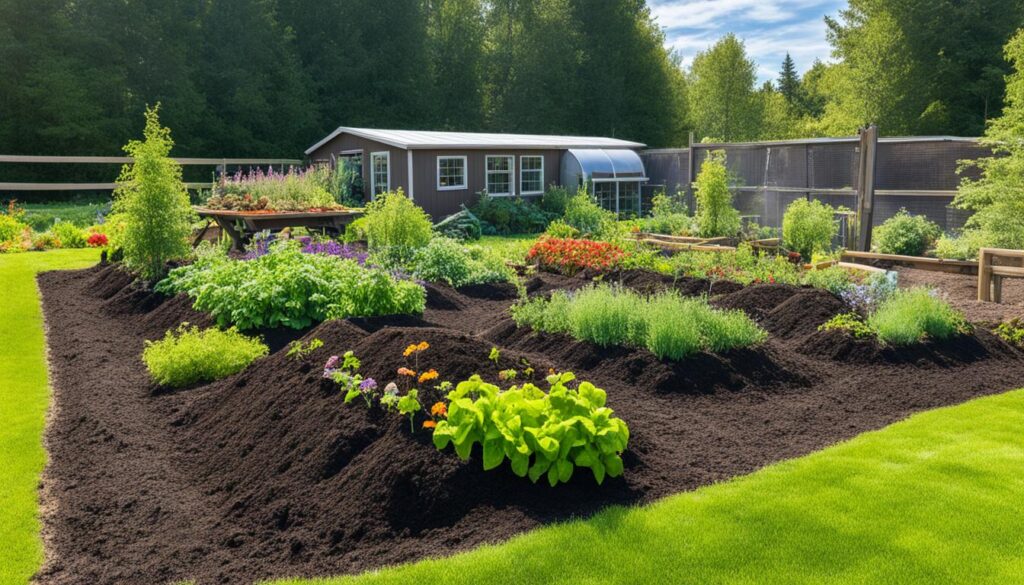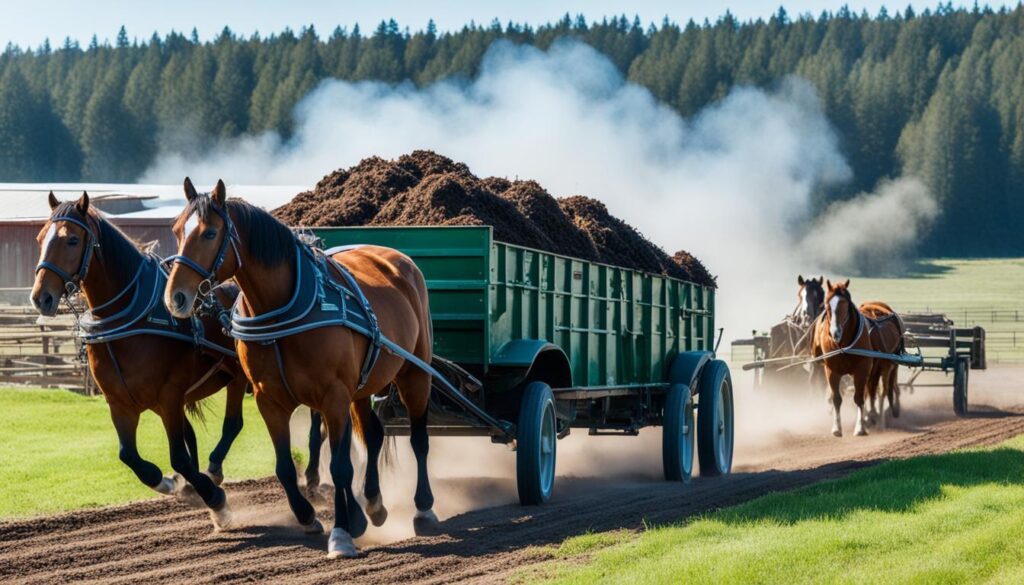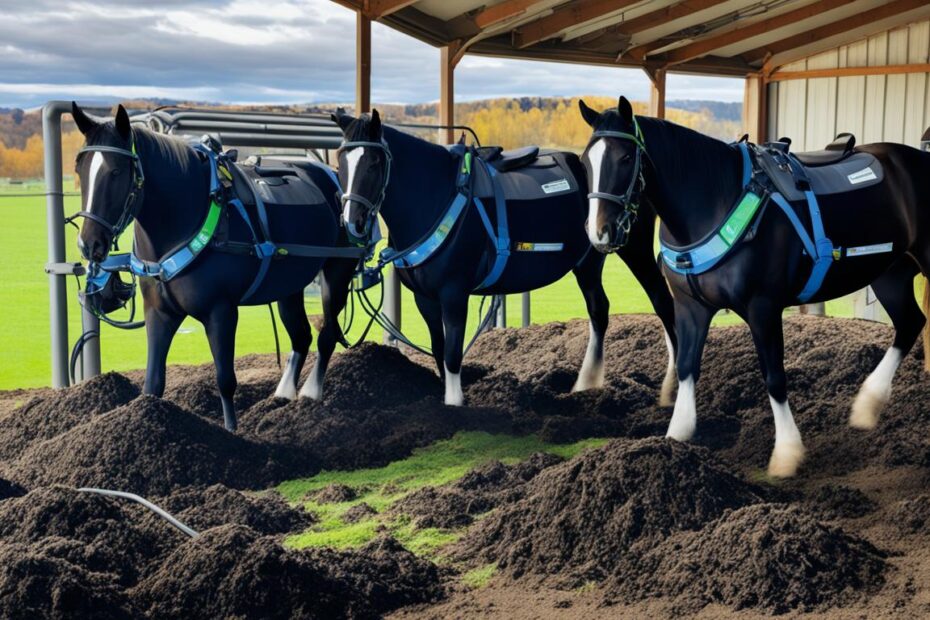In the ever-evolving world of sustainable agriculture, innovative solutions are emerging to address the pressing issue of organic waste management. One such breakthrough approach is the utilization of equine-powered systems for organic waste management on farms.
This pioneering concept not only tackles the challenge of effective waste disposal but also presents a path towards more environmentally responsible and resource-efficient horse farming practices.
Equine-powered systems for organic waste management offer a holistic solution that harnesses the unique capabilities of horses to create a closed-loop cycle of resource utilization.
By leveraging the natural processes inherent in equine waste, farmers can transform what was once considered a liability into a valuable asset, ultimately enhancing the overall sustainability of their operations.
Key Takeaways
- Equine-powered systems for organic waste management provide sustainable solutions for farms.
- These systems leverage the natural processes of horse waste to create a closed-loop cycle of resource utilization.
- Adopting equine-powered waste management can enhance the overall sustainability and environmental responsibility of horse farming practices.
- Innovative approaches to organic waste management are crucial for the future of sustainable agriculture.
- Integrating equine-powered systems can contribute to the development of regenerative agricultural practices.
Introduction to Equine-Powered Organic Waste Management
Sustainable horse farming is a crucial component of a circular economy, where the waste generated by equine operations is transformed into valuable resources.
By harnessing the power of horse manure composting and equine waste recycling, farmers can not only reduce their environmental impact but also create a sustainable supply of natural fertilizer for their land.
The Benefits of Sustainable Horse Farming
Sustainable horse farming offers a range of benefits, including:
- Reduced greenhouse gas emissions and improved air quality through the proper management of horse manure
- Increased soil fertility and nutrient cycling by utilizing composted equine waste as a natural fertilizer
- Decreased reliance on synthetic fertilizers, which can have a harmful impact on the environment
- Enhanced water conservation and reduced water pollution through responsible manure management practices
Challenges in Traditional Equine Waste Disposal Methods
Traditional methods of equine waste disposal, such as landfilling or direct application to fields, can pose significant environmental challenges.
These methods can lead to issues like groundwater contamination, air pollution, and the loss of valuable nutrients that could be recycled back into the soil. Equine-powered organic waste management systems offer a more sustainable solution by transforming horse manure into a valuable resource.
By embracing these innovative approaches, horse farmers can not only improve the environmental sustainability of their operations but also contribute to the development of a more circular and regenerative agricultural system.
Understanding Equine-Powered Systems for Organic Waste Management
Equine-powered systems for organic waste management offer a sustainable approach to managing the unique challenges associated with horse farming.
These innovative solutions leverage the natural behaviors and characteristics of horses to create efficient and eco-friendly waste management processes on farms.
At the heart of these systems is the recognition that horse manure, when properly managed, can be a valuable resource.
By harnessing the natural digestive processes of horses, farmers can transform equine waste into a nutrient-rich fertilizer that can be used to enrich the soil and support sustainable agricultural practices.
- Equine-powered systems harness the natural behaviors of horses to facilitate efficient waste management.
- These systems recognize the inherent value of horse manure as a nutrient-rich organic fertilizer.
- Proper management of equine waste can contribute to the overall sustainability of horse farming operations.
By understanding the principles and mechanics behind equine-powered systems for organic waste management, farmers can implement innovative and eco-friendly practices that not only address the challenges of equine waste disposal but also contribute to the wider sustainability of their operations.
| Conventional Waste Disposal | Equine-Powered Waste Management |
|---|---|
| Landfilling or incineration of horse manure | Composting and repurposing of equine waste as organic fertilizer |
| Potential environmental impacts and resource waste | Closed-loop system that recycles nutrients and contributes to soil health |
| Costly and labor-intensive waste management processes | Cost-effective and sustainable waste management solutions |
By embracing equine-powered systems for organic waste management, farmers can unlock the full potential of their horse farming operations, fostering sustainable practices that benefit both the environment and their businesses.
Horse Manure Composting: A Valuable Resource
In the realm of equine-powered organic waste management, horse manure composting emerges as a sustainable solution that transforms a potential challenge into a valuable resource.
By harnessing the natural decomposition process, farmers and equestrian facilities can convert horse manure into a nutrient-rich organic fertilizer, reducing their reliance on synthetic alternatives and contributing to a more circular agricultural ecosystem.
The Composting Process for Equine Waste
The composting process for equine waste involves carefully balancing the key ingredients: carbon-rich materials, such as straw or sawdust, and nitrogen-rich horse manure.
By layering these components and monitoring the moisture and temperature, the microorganisms responsible for decomposition can thrive, breaking down the organic matter over time.
This controlled environment ensures the efficient breakdown of the waste, resulting in a nutrient-dense compost that can be utilized as a natural fertilizer.
Utilizing Composted Manure as Organic Fertilizer
The composted horse manure, rich in essential nutrients like nitrogen, phosphorus, and potassium, can be applied directly to fields, gardens, and landscaping projects, providing a sustainable and eco-friendly alternative to synthetic fertilizers.
This organic fertilizer not only nourishes the soil, but also improves its structure, water-holding capacity, and overall health, contributing to the long-term fertility of the land.
By embracing the power of horse manure composting, equine-powered organic waste management systems can create a closed-loop system, where the waste produced on-site is transformed into a valuable resource, reducing the environmental impact and promoting a more sustainable approach to farming and equestrian operations.

Equine Waste Recycling: Closing the Loop
In the quest for sustainable solutions, equine waste recycling has emerged as a transformative approach. By repurposing horse manure for energy production, we can unlock a wealth of untapped potential, further enhancing the efficiency and environmental stewardship of equine-powered systems.
Repurposing Horse Manure for Energy Production
Equine waste, rich in organic matter and nutrients, can be leveraged to generate renewable energy through various innovative technologies.
From anaerobic digestion to pyrolysis, these methods harness the inherent energy content of horse manure, converting it into valuable biofuels, biogas, or even electricity.
The benefits of this approach are multifaceted. Not only does it reduce the environmental impact of traditional equine waste disposal, but it also creates new revenue streams for farmers and horse owners.
By transforming waste into a valuable energy source, the concept of equine waste recycling truly embodies the principles of organic waste valorization.
Moreover, the energy produced from equine waste can be utilized on-site, powering equestrian facilities, or even fed back into the grid, contributing to a more sustainable energy mix.
This closed-loop system minimizes waste, maximizes resource efficiency, and aligns with the broader goals of energy production and environmental stewardship.
As the equine industry continues to evolve, the integration of equine waste recycling practices will be crucial in driving towards a more circular and sustainable future.
By harnessing the inherent potential of horse manure, we can pave the way for a greener, more resilient equine-powered ecosystem.
Green Stable Operations and Eco-Friendly Equestrian Practices
Embracing green stable operations and eco-friendly equestrian practices is crucial for creating a more environmentally responsible approach to horse keeping.
By adopting sustainable strategies, equestrian enthusiasts can reduce their environmental impact and contribute to the overall well-being of the planet.
One key aspect of green stable operations is proper manure management. Implementing equine-powered organic waste management systems can transform horse waste into valuable resources, such as nutrient-rich compost or even renewable energy.
This not only diverts waste from landfills but also provides a sustainable solution for enhancing soil fertility and reducing the reliance on synthetic fertilizers.
Beyond waste management, eco-friendly equestrian practices encompass a range of initiatives that promote conservation and environmental stewardship. This includes:
- Utilizing energy-efficient technologies in stable operations, such as LED lighting and solar power
- Implementing water-saving measures, like rainwater harvesting and gray water reuse
- Adopting sustainable land management practices, such as rotational grazing and native plant landscaping
- Promoting responsible horse transportation and reducing the carbon footprint associated with equestrian activities
By embracing these green stable operations and eco-friendly equestrian practices, horse enthusiasts can become active participants in the movement towards a more environmentally responsible and sustainable future for the equine industry.
| Sustainable Stable Feature | Benefits |
|---|---|
| Renewable Energy Systems | Reduced reliance on fossil fuels, lower energy costs, and a smaller carbon footprint |
| Water Conservation Strategies | Conserve a valuable natural resource, minimize wastewater, and lower utility bills |
| Organic Waste Recycling | Transform horse manure into nutrient-rich compost, reducing waste and enhancing soil health |
Equine-Powered Systems for Organic Waste Management
Equine-powered systems for organic waste management offer a comprehensive solution to the challenges faced on farms, seamlessly integrating the principles and processes discussed in the previous sections.
These innovative systems leverage the natural abilities of horses to transform organic waste into valuable resources, driving a sustainable cycle that benefits both the environment and farm operations.
At the core of equine-powered organic waste management is the concept of closing the loop. Horse manure, a byproduct of sustainable horse farming, is meticulously collected and converted into high-quality compost through a carefully monitored composting process.
This nutrient-rich compost can then be applied as an organic fertilizer, replenishing the soil and supporting the growth of crops and forage for the farm’s livestock, including the horses themselves.
| Benefits of Equine-Powered Organic Waste Management | Key Features |
|---|---|
| Reduces reliance on synthetic fertilizers Enhances soil health and fertility Promotes sustainable agriculture practices Generates renewable energy through manure-to-energy systems Minimizes environmental impact of waste disposal | Integrated manure collection and composting systems Utilization of composted manure as organic fertilizer Anaerobic digestion for biogas production Closed-loop recycling of organic waste Compliance with environmental regulations |
By embracing equine-powered systems for organic waste management, farms can not only address the challenges of traditional waste disposal methods but also unlock a wealth of opportunities for sustainable and regenerative agriculture.
These innovative solutions pave the way for a more eco-friendly future, where the byproducts of animal husbandry are transformed into valuable resources, contributing to the overall sustainability of the farming ecosystem.

Animal Waste Management Solutions for Sustainable Farming
As the agricultural industry strives for greater sustainability, integrating equine waste management into regenerative farming practices has emerged as a promising solution.
Equine-powered organic waste management systems can play a pivotal role in achieving the delicate balance between productive agriculture and environmental stewardship.
Integrating Equine Waste Management into Regenerative Agriculture
Regenerative agriculture is a holistic approach that aims to restore soil health, enhance biodiversity, and improve overall ecosystem resilience. By incorporating equine waste management into this framework, farmers can unlock a wealth of benefits for their land and operations.
- Closed-loop nutrient cycling: Equine waste can be composted and transformed into nutrient-rich organic fertilizer, effectively closing the loop and reducing reliance on synthetic inputs.
- Soil health enhancement: The application of composted equine manure can improve soil structure, increase water-holding capacity, and promote the growth of beneficial microorganisms.
- Improved greenhouse gas mitigation: Properly managed equine waste can reduce methane and nitrous oxide emissions, contributing to climate change mitigation efforts.
By embracing these animal waste management solutions, farmers can unlock the full potential of sustainable farming and regenerative agriculture, paving the way for a more harmonious and resilient agricultural landscape.
Natural Fertilizer Production from Equine Waste
Transforming equine waste into a valuable natural fertilizer is a sustainable solution that benefits both farms and the environment.
The process of producing high-quality organic fertilizer from horse manure involves several critical steps to ensure safety and effectiveness.
Quality Control and Safety Measures
Producing natural fertilizer from equine waste requires meticulous quality control measures to guarantee the final product meets industry standards.
This includes thorough testing and analysis to verify the absence of harmful pathogens, heavy metals, and other contaminants. Proper handling, storage, and processing techniques are also essential to maintain the integrity and purity of the organic fertilizer.
Key quality control and safety measures in the production of natural fertilizer from equine waste include:
- Rigorous pathogen testing to eliminate risks of E. coli, salmonella, and other harmful bacteria
- Heavy metal analysis to ensure compliance with regulatory limits
- Monitoring of nutrient content and composition for consistent quality
- Careful monitoring of the composting process to optimize temperature, moisture, and aeration
- Adherence to industry best practices and safety protocols throughout the entire production cycle
By implementing these measures, farms can produce high-quality organic natural fertilizer production and organic fertilizer production from equine waste, ensuring the safety and efficacy of the final product.
| Parameter | Acceptable Range | Frequency of Testing |
|---|---|---|
| Pathogens (E. coli, Salmonella) | Below detection limits | Weekly |
| Heavy Metals (Pb, Cd, Hg, As) | Within regulatory limits | Monthly |
| Nutrient Content (N, P, K) | Consistent with label claims | Quarterly |
| Moisture Content | 40-60% | Daily |
By adhering to these rigorous quality control measures, farms can produce high-quality, safe, and effective organic fertilizer from equine waste, contributing to sustainable agricultural practices.
Organic Waste Valorization: Maximizing Resource Efficiency
Embracing the concept of organic waste valorization is key to unlocking the true potential of equine-powered systems.
This innovative approach explores how the various components of equine waste can be utilized to their fullest, minimizing waste and maximizing resource efficiency. By adopting sustainable horse farming practices, horse owners can contribute to a more circular and eco-friendly ecosystem.
At the heart of organic waste valorization lies the recognition that equine waste is not merely a byproduct, but a valuable resource.
Through careful processing and repurposing, the nutrients, energy, and other beneficial properties inherent in horse manure can be harnessed to support a wide range of agricultural and energy-related applications.
Unlocking the Value of Equine Waste
The valorization of organic waste encompasses several transformative strategies:
- Composting horse manure to create nutrient-rich organic fertilizer for sustainable farming
- Extracting biogas from equine waste for renewable energy production
- Utilizing equine bedding materials as a source of biofuel or animal bedding
- Integrating equine waste management into regenerative agriculture practices
By embracing these innovative approaches, horse owners can not only minimize their environmental impact but also contribute to the broader goals of resource efficiency and sustainable development.
| Organic Waste Valorization Strategies | Benefits |
|---|---|
| Composting horse manure | Produces nutrient-rich organic fertilizer for sustainable farming |
| Biogas extraction from equine waste | Generates renewable energy for on-site use or grid injection |
| Repurposing equine bedding materials | Provides a source of biofuel or animal bedding |
| Integrating equine waste management into regenerative agriculture | Enhances soil health and contributes to a circular economy |
By embracing organic waste valorization, horse owners can transform their equine-powered systems into models of resource efficiency and sustainability, setting the standard for the future of responsible horse farming.
Conclusion
As we conclude this exploration of equine-powered systems for organic waste management, it’s clear that these sustainable practices offer a compelling solution for farms grappling with the challenges of traditional waste disposal.
By embracing equine-powered systems for organic waste management, farmers can not only address the environmental concerns associated with equine waste but also unlock a valuable resource for their operations.
The benefits of sustainable horse farming are multifaceted, ranging from the production of nutrient-rich compost to the generation of renewable energy.
Through innovative approaches like manure composting and waste-to-energy conversion, farms can create a more circular, resource-efficient ecosystem that minimizes waste and maximizes the value of their equine resources.
Ultimately, the adoption of eco-friendly equestrian practices is not just a matter of environmental responsibility but also a strategic investment in the long-term viability and productivity of farming operations.
By leveraging the power of equine-driven organic waste management, farmers can enhance soil fertility, reduce their carbon footprint, and contribute to the broader movement towards sustainable agriculture.
FAQ
What are the benefits of sustainable horse farming?
Sustainable horse farming offers numerous benefits, including reduced environmental impact, improved resource utilization, and the production of valuable byproducts.
By adopting eco-friendly equestrian practices, farmers can minimize waste, recycle organic materials, and contribute to a more circular and resource-efficient agricultural ecosystem.
What are the challenges in traditional equine waste disposal methods?
Traditional equine waste disposal methods, such as direct landfilling or improper handling, can lead to environmental issues, including groundwater contamination, air pollution, and the loss of valuable organic matter. These methods often fail to maximize the potential of equine waste as a resource.
How do equine-powered systems address organic waste management?
Equine-powered systems leverage the unique characteristics and behaviors of horses to create efficient and eco-friendly waste management solutions.
By integrating horses into the waste management process, farmers can harness the power of equine waste for composting, energy production, and the creation of high-quality organic fertilizers, closing the loop and promoting sustainable horse farming practices.
What is the process of horse manure composting?
The composting process for equine waste involves carefully managing the temperature, moisture, and aeration to facilitate the breakdown of organic matter.
This results in a nutrient-rich compost that can be utilized as a valuable organic fertilizer, reducing the reliance on synthetic alternatives and contributing to a more sustainable agricultural system.
How can equine waste be repurposed for energy production?
Equine waste can be repurposed for energy production through various methods, such as anaerobic digestion or thermal conversion.
These processes convert the organic matter in horse manure into renewable energy sources, further enhancing the sustainability and resource efficiency of equine-powered systems.
What are the key principles of green stable operations and eco-friendly equestrian practices?
Green stable operations and eco-friendly equestrian practices involve a holistic approach to horse keeping, including proper waste management, water conservation, energy efficiency, and the adoption of sustainable practices throughout the equestrian facility.
These principles help create environmentally responsible horse farming operations that minimize the impact on the surrounding ecosystem.
How can equine waste management be integrated into regenerative agriculture?
Integrating equine waste management into regenerative agriculture can contribute to a more sustainable and ecologically balanced farming system.
By leveraging the nutrient-rich compost and byproducts from equine waste, farmers can enhance soil health, promote biodiversity, and create a symbiotic relationship between horse farming and other agricultural activities.

